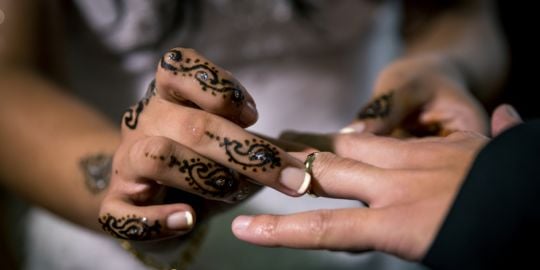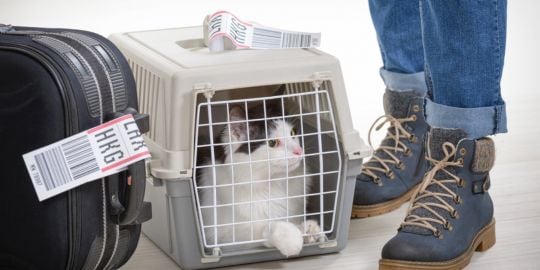SWITZERLAND - Since moving to Switzerland 19 years ago, I have experienced my fair share of discrimination: My race, job, size and religion among others.
I took it all in with dignity, proud of my roots as a Filipino. It was not easy. But I managed to keep my sanity by focusing on my family, growing children, work, and projects that will help reach out to others.
Looking back, I should say I was able to hold my ground during encounters wherein any other individual would have shied and ran away.
At school
When my daughters got sick for two weeks, I was deprived of sleep and forgot to bring a document to the kindergarten class. Across the street, the Swiss-Italian kindergarten teacher screamed at me in Italian, “Hey, Asian brownie, what kind of memory do you have? I heard that many women in your country are in prostitution. Is that how you fished out your Swiss husband?”
Other mothers waited for my reaction as I fought to hold back tears that were threatening to fall. I replied calmly in Italian, “Can I set an appointment with you so we can talk about my country?”
The Swiss Italian teacher who did not speak English was quite impressed on how I fluently spoke Italian without any foreign accent. I told her that her overt, hostile statement was offensive, based on her very limited knowledge of the Philippines no thanks to Swiss-Italian TV programs.
Aided by a travel book, I explained to her at great length our Philippine history as well as how much we value our education, family, strong spiritual foundation and concern for compatriots. Needless to say, I gained her respect.
At home
The worst discrimination I suffered was with my former, Swiss-Italian husband. He treated me like I was “nothing.” For him a woman's role is to obey the man, serve the man and stay at home. As a religious woman taking seriously the vows of matrimony, I submitted myself to his chauvinistic demands but was treated like a slave for seven years. Luckily, I found a good job at an aviation company, giving me the courage to file for divorce.
Even that did not free me from more racial slurs.
Once during shopping, I was approached by an Italian woman shouting insults at me.
“Stay away from my son! You're a divorced woman with baggage, too young and small to be a mother! You married a Swiss to have a better life. You come from a Third World country, just looking for someone to lean on,” screamed the woman.
Later, I realized that her 30-year-old son was one of my suitors, sending me flowers. With controlled anger and a fair amount of respect for the woman, I shot back in fluent Italian, “If you wish to talk to me, do so without prejudice.”
I added, “What is it in a Third World country that makes First World people like you behave in the way you do? I married because of love but was treated like a slave. My daughters are not baggage, they are my life. I'm not interested in your son!”
At work
While working in a law firm, I had to endure daily insults from a lawyer.
One such encounter went this way: “Didn't you consider how lucky you are working for us and not work as a maid like your compatriots in Italy or are you much better in cleaning toilets than working on my court cases?”
Calmly I replied, “To match your provocations with anger will only court disaster. Most of my compatriots are degree holders too. It's the system that does not give them much better job opportunities because companies save money on lower salary by giving the lowly jobs to migrants.”
Fellow Filipinos discriminate, too
A Filipino friend, jealous of my suitors of German, French, Italian, Swiss, Dutch, Finnish and American nationalities, showed her claws by spreading rumors about me to our friends.
“She's very much a European now, so modern, so precise, too independent. Maybe, she is collecting passports so she dated them,” remarked the friend.
It's one of those sad realities that some kababayans don't look at divorce with an open mind. One time, as I was going out of the church, a lady exclaimed at me:
“You left your husband! You're doomed for life! You still go to church?”
I replied, “Did the church issue a ban on divorcees? Did you see me melt to ashes when I knelt down to pray? Or do you want to check my ticket to heaven or hell?”
Things to do
How should you act when facing discrimination?
It is wise to reply and act in a diplomatic way with self-respect and dignity intact. Learn to speak fluently the language of your new country. Knowing their history, culture and social mores will give you more confidence when talking to them.
Don't let any form of discrimination lower your self-esteem.
Be the better person, exercise patience, broaden your insights, and weigh the degree of the circumstance. That way you can flexibly handle the situation with wit, humor, dignity, finesse, wisdom and respect.
You have RIGHTS against discrimination
Following the Amsterdam Treaty in 2009, The European Union mandates every member state to protect your rights against discrimination in religion or belief in school or workplace, sexual orientation in the areas of social protection, social advantages and access to good and services, ancestry, skin color, disability, age, chronic diseases and civil status.
You have a right to go to court and are entitled to compensation when it is proven that you have been discriminated.
What you should do if you feel discriminated?
1. Be informed - know the official organizations in your country that helps victims of discrimination, the legal and administrative procedures, the nature of legal coercion available, how to prove that the discrimination took place, etc.
2. Write it down - make notes of what happened, who said what, where did it take place, were there witnesses and why did you feel that you were discriminated.
3. Register it with the authorities - you can go to the police, call anti-discrimination hotlines in your country or talk to official organizations that can help you. It is important to make your complaint official.
How this Filipina coped with discrimination in Switzerland
This breaks my heart...definitely an eye opener for all pinoy expats across the world.
If this is your story, may God be your shield day by day.
No matter how hard, do not let racial slurs break down your self-esteem.
Just keep in mind that maybe there is one person or wherever you are that respects you well and treats you as a human.
I HOPE THIS THREAD/TOPIC WILL BE AN INSPIRATION TO EVERYONE OF US.
thank you for reading!!
Dear Jimmusan,
Thank you for sharing your experience and for your valuable tips. Learned alot by reading your post.
jimmusan wrote:SWITZERLAND - Since moving to Switzerland 19 years ago, I have experienced my fair share of discrimination: My race, job, size and religion among others.
I took it all in with dignity, proud of my roots as a Filipino. It was not easy. But I managed to keep my sanity by focusing on my family, growing children, work, and projects that will help reach out to others.
Looking back, I should say I was able to hold my ground during encounters wherein any other individual would have shied and ran away.
At school
When my daughters got sick for two weeks, I was deprived of sleep and forgot to bring a document to the kindergarten class. Across the street, the Swiss-Italian kindergarten teacher screamed at me in Italian, “Hey, Asian brownie, what kind of memory do you have? I heard that many women in your country are in prostitution. Is that how you fished out your Swiss husband?”
Other mothers waited for my reaction as I fought to hold back tears that were threatening to fall. I replied calmly in Italian, “Can I set an appointment with you so we can talk about my country?”
The Swiss Italian teacher who did not speak English was quite impressed on how I fluently spoke Italian without any foreign accent. I told her that her overt, hostile statement was offensive, based on her very limited knowledge of the Philippines no thanks to Swiss-Italian TV programs.
Aided by a travel book, I explained to her at great length our Philippine history as well as how much we value our education, family, strong spiritual foundation and concern for compatriots. Needless to say, I gained her respect.
At home
The worst discrimination I suffered was with my former, Swiss-Italian husband. He treated me like I was “nothing.” For him a woman's role is to obey the man, serve the man and stay at home. As a religious woman taking seriously the vows of matrimony, I submitted myself to his chauvinistic demands but was treated like a slave for seven years. Luckily, I found a good job at an aviation company, giving me the courage to file for divorce.
Even that did not free me from more racial slurs.
Once during shopping, I was approached by an Italian woman shouting insults at me.
“Stay away from my son! You're a divorced woman with baggage, too young and small to be a mother! You married a Swiss to have a better life. You come from a Third World country, just looking for someone to lean on,” screamed the woman.
Later, I realized that her 30-year-old son was one of my suitors, sending me flowers. With controlled anger and a fair amount of respect for the woman, I shot back in fluent Italian, “If you wish to talk to me, do so without prejudice.”
I added, “What is it in a Third World country that makes First World people like you behave in the way you do? I married because of love but was treated like a slave. My daughters are not baggage, they are my life. I'm not interested in your son!”
At work
While working in a law firm, I had to endure daily insults from a lawyer.
One such encounter went this way: “Didn't you consider how lucky you are working for us and not work as a maid like your compatriots in Italy or are you much better in cleaning toilets than working on my court cases?”
Calmly I replied, “To match your provocations with anger will only court disaster. Most of my compatriots are degree holders too. It's the system that does not give them much better job opportunities because companies save money on lower salary by giving the lowly jobs to migrants.”
Fellow Filipinos discriminate, too
A Filipino friend, jealous of my suitors of German, French, Italian, Swiss, Dutch, Finnish and American nationalities, showed her claws by spreading rumors about me to our friends.
“She's very much a European now, so modern, so precise, too independent. Maybe, she is collecting passports so she dated them,” remarked the friend.
It's one of those sad realities that some kababayans don't look at divorce with an open mind. One time, as I was going out of the church, a lady exclaimed at me:
“You left your husband! You're doomed for life! You still go to church?”
I replied, “Did the church issue a ban on divorcees? Did you see me melt to ashes when I knelt down to pray? Or do you want to check my ticket to heaven or hell?”
Things to do
How should you act when facing discrimination?
It is wise to reply and act in a diplomatic way with self-respect and dignity intact. Learn to speak fluently the language of your new country. Knowing their history, culture and social mores will give you more confidence when talking to them.
Don't let any form of discrimination lower your self-esteem.
Be the better person, exercise patience, broaden your insights, and weigh the degree of the circumstance. That way you can flexibly handle the situation with wit, humor, dignity, finesse, wisdom and respect.
You have RIGHTS against discrimination
Following the Amsterdam Treaty in 2009, The European Union mandates every member state to protect your rights against discrimination in religion or belief in school or workplace, sexual orientation in the areas of social protection, social advantages and access to good and services, ancestry, skin color, disability, age, chronic diseases and civil status.
You have a right to go to court and are entitled to compensation when it is proven that you have been discriminated.
What you should do if you feel discriminated?
1. Be informed - know the official organizations in your country that helps victims of discrimination, the legal and administrative procedures, the nature of legal coercion available, how to prove that the discrimination took place, etc.
2. Write it down - make notes of what happened, who said what, where did it take place, were there witnesses and why did you feel that you were discriminated.
3. Register it with the authorities - you can go to the police, call anti-discrimination hotlines in your country or talk to official organizations that can help you. It is important to make your complaint official.
Dear Jimmusan,
I am moved and impressed by your near Buddhist/ Gandhian handling of the several discriminatory slanders thrown your way and the courage you honourably showed in dealing with those situations. HATS OFF! May GOD always be with you and all others who follow what is right and the path of the ALMIGHTY!
Regards.
@VKR this didn't happen to HIM. He re-posted a story he read somewhere online.









